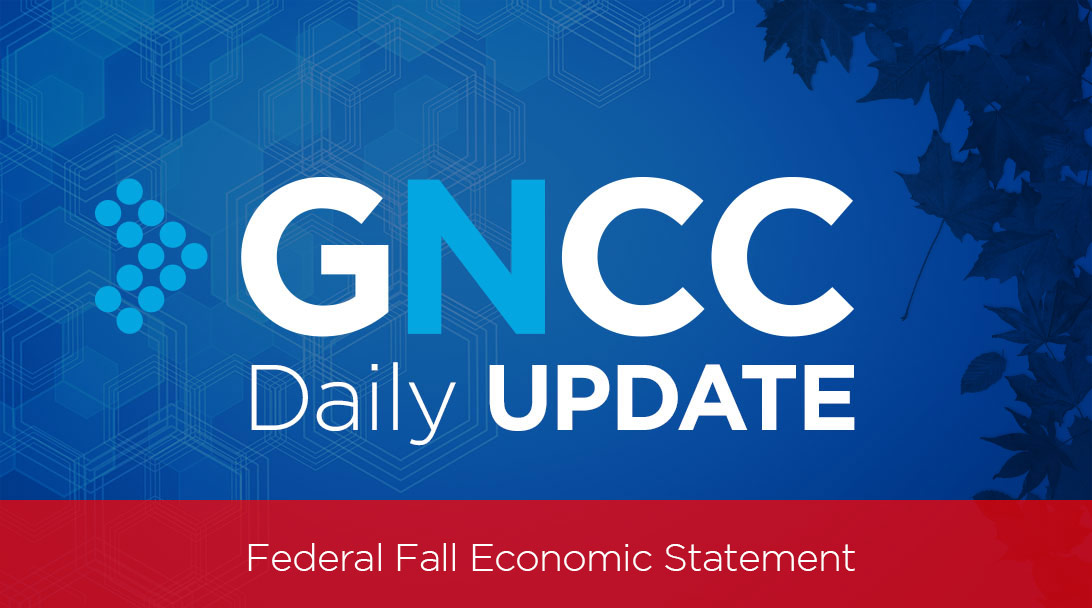In this edition:
- Federal government’s fall economic statement
- Canada’s inflation rate cools to 3.1% but the cost of living keeps going up
- Ontario reaches tentative central agreement with public elementary teachers
- Niagara-on-the-Lake launches snowplow tracking software
- Town of Pelham ratifies new agreement with CUPE Local 1287
- Focus on Finance and Economy

Federal government’s fall economic statement
Today, the Honourable Chrystia Freeland, Deputy Prime Minister and Minister of Finance, delivered the federal government’s fall economic statement which acts as an update on the federal government’s finances, as well as introduces new measures reflective of the government’s priorities.
For the complete address of the 2023 Fall Economic Statement by the Finance Minister click here.
Highlights include the following:
- New federal spending since the spring budget: $20.8 billion.
- Total government spending for the current fiscal year, through the end of March 2024: $488.7 billion.
- The real rate of GDP growth for 2023: 1.1 per cent.
- The updated deficit for this year: $40 billion.
- Next year’s projected deficit: $38.4 billion.
- Incentives to construct rental and affordable housing:
- The federal government will spend an additional $1 billion to build more affordable homes. The extra money, spread over three years, will support co-op housing and non-profit and public housing providers, to build 7,000 more homes by 2028.
- Financing more rental housing by providing $15 billion for loans through the Apartment Construction Loan Program, to help build 30,000 new homes.
- New Canadian Mortgage Charter:
- Mortgage holders in financial difficulty on their principal residence can expect to receive fair, reasonable, and timely mortgage relief measures from their federally-regulated financial institutions, which are expected to proactively reach out to vulnerable borrowers and make full use of available tools to quickly and efficiently support borrowers through difficult times.
- Short-term rentals:
- To free up more rental properties, the government will deny income tax deductions for Airbnb’s, in provinces and towns – including Toronto, Montreal and Vancouver – which have taken action to restrict short-term rentals.
- New deficit targets:
- The federal government is pledging to keep the size of future federal deficits at no more than 1 per cent of GDP, starting in 2026-27. That works out to about $32-billion.
- Cleantech economic investment
- Up to $7 billion: The proportion of a cleantech economic investment fund being allocated for special contracts intended to give companies the confidence they need to make major investments to lower their greenhouse-gas emissions.

Canada’s inflation rate cools to 3.1% but the cost of living keeps going up
Canada’s consumer price index rose by 3.1 per cent in the year up to October, down from 3.8 per cent the previous month but in line with what economists were expecting.
Statistics Canada reported Tuesday that the biggest reason for the deceleration in the cost of living was a drop in the cost of gasoline, which declined by 6.4 per cent during the month of October alone, and is down by 7.8 per cent compared to where prices were a year ago.
If gasoline is stripped out of the numbers, the inflation rate would have been 3.6 per cent in October. That’s slightly lower than the 3.7 per cent non-gasoline inflation rate clocked the month before.
Food prices increased at a 5.4 per cent pace over the past year. While that’s still higher than the overall inflation rate, it’s down from the 5.8 per cent annual pace seen in September.

Ontario reaches tentative central agreement with public elementary teachers
Public elementary school teachers have reached a tentative contract deal with the provincial government.
When ratified, Tuesday’s agreement would apply to over 80,000 union members, including elementary and occasional teachers, according to the union. Members of the Elementary Teachers’ Federation of Ontario (ETFO) had previously voted 95 per cent in favour of a strike, with union leadership saying it would help to put pressure on the government to reach a deal at the bargaining table.
The union says details of the agreement will be shared with workers on Thursday. A ratification vote is currently being scheduled.


Did you know?
Canada is tied with the United States for second-best credit rating in the world.
Focus on Finance and Economy
Inflation-weary consumers send mixed signals as Black Friday sales kick off
Denise Paglinawan, Financial Post
Canadian retailers say they still expect the holiday shopping season to be a busy one, despite mixed signals on how much cost-conscious consumers plan to spend.
The Retail Council of Canada, which represents retail businesses of all sizes, said that despite the growing financial pressures, 90 per cent of Canadian consumers still plan to shop during the holiday season, which kicked off this week with the launch of Black Friday sales.
Through the Daily Updates, the GNCC aims to deliver important business news in a timely manner. We disseminate all news and information we feel will be important to businesses. Inclusion in the Daily Update is not an endorsement by the GNCC.



